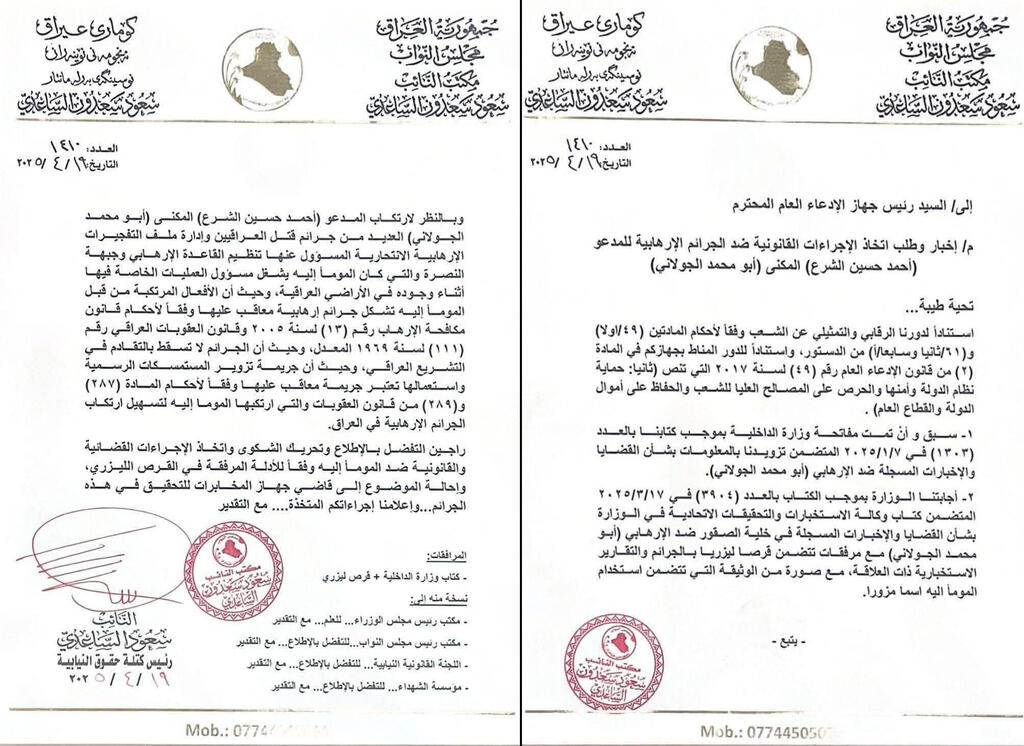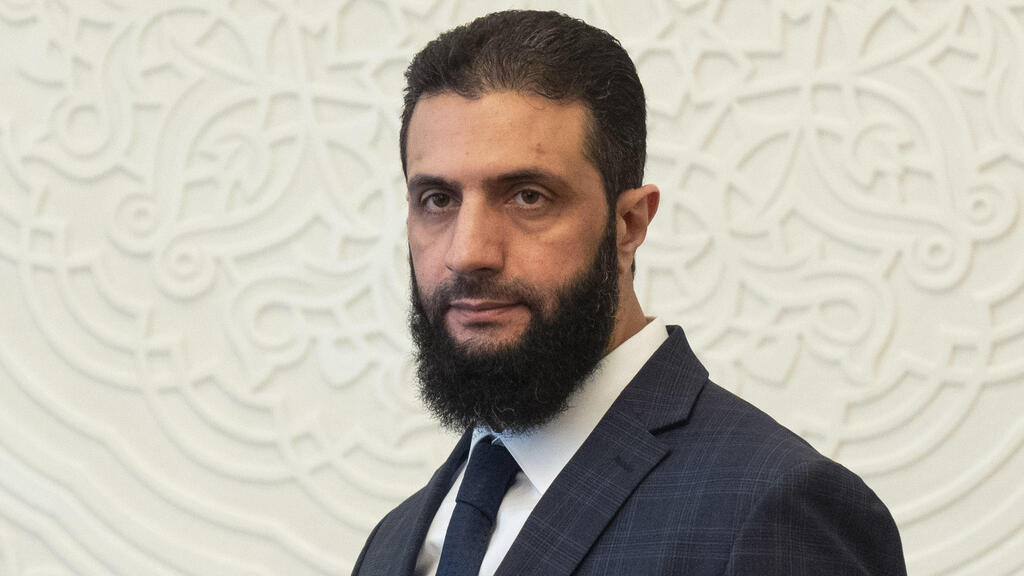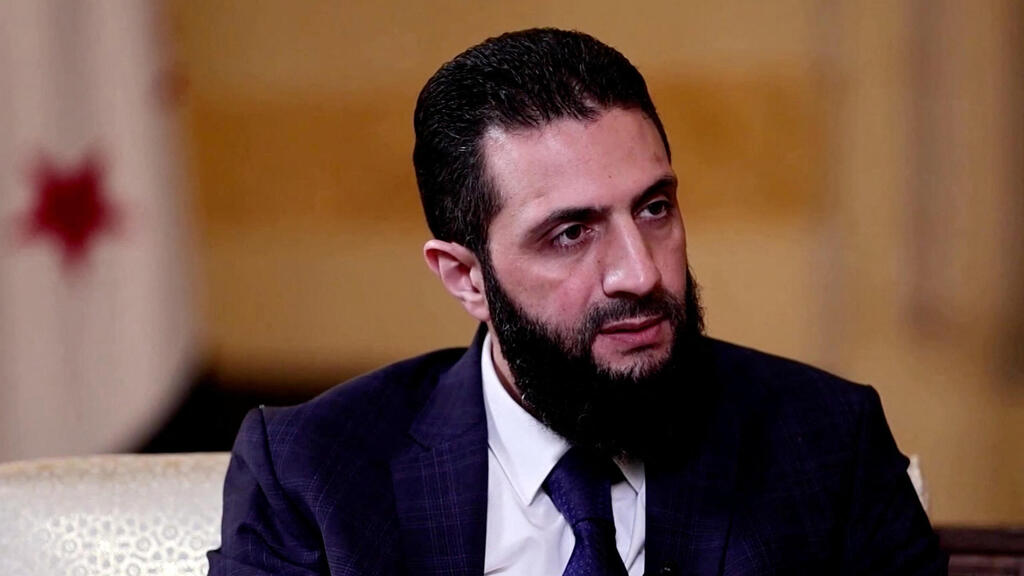Getting your Trinity Audio player ready...
Iraq’s Parliament has requested the arrest of Syrian President Ahmad al-Sharaa — previously known as “Abu Mohammad al-Jolani” — on allegations of terrorism and document forgery. A leaked memo shows that lawmakers sent the request to the Office of the Public Prosecutor in Baghdad. The call for legal action comes as al-Sharaa is expected to visit Iraq for the upcoming Arab League Summit, stirring political friction inside the country.
The letter, issued by Iraq’s Council of Representatives to the Office of the Public Prosecutor in Baghdad, urges an investigation and potential arrest of al-Sharaa should he enter Iraqi territory. The timing of the request, ahead of the upcoming Arab League Summit in Baghdad, reflects deep divisions within Iraq’s political establishment.
Warrant in the making?
A senior diplomatic source in Baghdad said that the memorandum accuses al-Sharaa of involvement in bombings and other terrorist acts, as well as using forged documents during his earlier presence in Iraq. The document refers to him by his former alias, " Abu Mohammad al-Jolani," linked to his leadership of the jihadist group Hay’at Tahrir al-Sham (HTS), once known as Jabhat al-Nusra.
The same source said the legal request was filed in anticipation of al-Sharaa’s possible arrival for the Arab Summit—his attendance has already sparked strong objections in Iraqi political circles.
Parliament pushes back
Over 50 Iraqi lawmakers have formally petitioned the Speaker of Parliament, urging the government to bar al-Sharaa from entering the country. Legislators say Iraq should not host a leader once associated with armed insurgency—especially at a high-profile diplomatic gathering.
Get the Ynetnews app on your smartphone: Google Play: https://bit.ly/4eJ37pE | Apple App Store: https://bit.ly/3ZL7iNv
MP Yousef al-Kalabi of the Shiite Coordination Framework described the move as “a moral and national duty to honor the victims and their families.” He added, “Allowing al-Sharaa into Iraq would be a betrayal of the memory of Iraqis who suffered under terrorism, in which al-Sharaa played a role,” referencing his alleged ties to post-2003 insurgent violence.
Syrian affairs analyst Dr. Mustafa al-Nuaimi said that “such statements reflect legitimate fears among some Iraqi factions regarding the rehabilitation of figures linked to Iraq’s violent past.” He added, “Al-Sharaa spent significant time in Iraq over the last two decades, and multiple security reports have tied him to extremist activities—especially during the US occupation and the subsequent years of sectarian conflict.”
Invitation despite objections
In contrast to parliamentary resistance, Iraqi Prime Minister Mohammed Shia’ al-Sudani has welcomed al-Sharaa’s participation and confirmed that an invitation was formally extended to Damascus.
At a recent press briefing, al-Sudani framed the move as part of Iraq’s diplomatic outreach. “Syria is a sister state, and we must not ignore its role in the evolving Arab landscape,” he said. He urged critics to “separate security-related legacies from today’s political realities,” emphasizing Iraq’s ambition to serve as a regional mediator.
From prisoner to president: al-Sharaa’s journey
The controversy surrounding al-Sharaa stems from his complex and controversial past. Once held in Iraq’s notorious Camp Bucca prison, he allegedly forged ties with senior al-Qaida figures, including future Islamic State leader Abu Bakr al-Baghdadi. After his release, al-Sharaa returned to Syria and became the founding commander of Jabhat al-Nusra.
Although Western governments—including the US—have designated HTS a terrorist organization, al-Sharaa later rebranded his public image through political maneuvering and media outreach. Following the fall of the Assad regime in 2024, al-Sharaa assumed leadership of Syria’s transitional government, drawing both regional support and international scrutiny.
A summit under scrutiny
The Arab League Summit in Baghdad was initially promoted as a chance for Iraq to reclaim diplomatic relevance in the post-conflict Middle East. But al-Sharaa’s invitation now risks overshadowing its message of unity.
Firas al-Khalidi, a Syrian opposition leader based in Cairo, said that “al-Sharaa’s attendance—should it happen—will be a litmus test for how far Arab states are willing to go in embracing former militant leaders who transition into political roles.” He said Arab governments will closely watch Baghdad’s handling of the issue, as it may set a precedent for reintegrating controversial figures into the regional fold.
Justice or realpolitik?
At its core, the debate is not only about one man’s record—it’s about whether Arab governments can reconcile justice and accountability with pragmatic diplomacy. Al-Sharaa’s presence could serve as a symbol of transformation, suggesting that former fighters can evolve into statesmen. But for many Iraqis, the trauma of past violence remains unresolved.
The broader question lingers: Can the region move forward by absorbing controversial figures into new political frameworks? Or does doing so risk deepening distrust and undermining efforts at transitional justice?
As Baghdad prepares to host one of the most consequential Arab summits in recent memory, the controversy surrounding al-Sharaa reflects the unhealed wounds of the past—and the high-stakes balancing act of post-conflict diplomacy.




